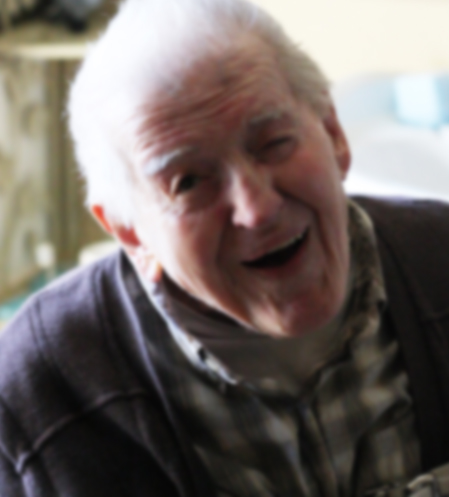by jillnovak | Mar 25, 2015 | I Laugh, I Cry, Taking Care of Grandpa

It’s early, but I’m already running late. I overslept, so my husband got my father up, changed and dressed him, and then wheeled him down to breakfast. Now it’s my turn to take over.
I make my way to the coffee pot and fill a red ceramic cup to the brim with freshly brewed Starbucks. I hope it will jump start my day, but it never seems to make a difference anymore.
“Do we have anything to work with today?” I ask my husband, wondering if “Grandpa” as we affectionately call him is alert or if it’s going to be one of “those” mornings when he sleeps through breakfast.
“He had severe flopposis again,” Robert says referring to Grandpa’s tendency to sleep with his neck unsupported at a 45 degree angle. I usually check on him in the middle of the night to make sure his head and shoulder are cushioned with a pillow, but last night, I forgot. I feel a twinge of guilt, but knowing the many times I’ve repositioned him in the wee hours of the morning, I let it go.
I glance in Grandpa’s direction out of the corner of my eye. The sight of his 94 year old body hunched over the table, catches my breath. As usual, his head is tilted far to the right, but this morning instead of being bright and alert, his eyes are steeled shut against the morning light. His gnarled hands lay lifeless beside his water glass which is placed squarely before him on a cheerful blue and white checkered placemat—a continual, and not so cheerful reminder that he must drink two full cups of water before he can eat . . . But before he can drink, he has to put in his upper dentures which are sitting on a paper napkin next to his plate. And before he can put in his dentures, he has to steady his left hand which is shaking uncontrollably. And so begins Grandpa’s morning ritual, a series of life-sustaining duties which hinge precariously, one upon the other.
It’s a scene I’m all too familiar with as I brace myself for the new day—one that resembles a long string of repetitive yesterdays that have made up the last six years of my life.You’d think I’d be used to it by now, but when I see how frail he is becoming, I hurt for him—and me.
I hate to see Grandpa grow old and lose his faculties, not only for himself, but for us too, and what it will mean for his future care. The more he loses, the more we will have to do for him, and we are already doing so much. You would think the need to hurry would decrease by the time you’re in your nineties, but for Grandpa, it isn’t so. The clock rules his day now—and mine. He used to be able to eat and drink in a reasonable amount of time, but now his meals are long and drawn out affairs from the neurological impairment he suffers.
A couple of years ago, he was diagnosed with silent dysphasia, a degenerative swallowing disorder which is a result of Parkinson’s. When Grandpa swallows, there is a two-second delay, so if he drinks too fast or tilts his head back too far to empty his cup, it goes right into his lungs, usually without any of the normal warning signs you would expect like coughing or choking. His gurgly voice is the only tell-tale sign that he has aspirated, and because of his handicap, it has become increasingly harder for him to accomplish anything on a daily basis, other than eating, drinking, and sleeping. I know he’d rather be writing on one of his many stories, but their just hasn’t been enough time in the day. In the face of such a menacing disability, the hours quickly tick away, the quality of life diminishes.
Suddenly, two weeks ago, Grandpa begins to gurgle like a peculator in the middle of the night. I suction him out to clear the extra fluid out of his lungs before I go back to bed. The next morning, I pull my chair up next to him and proceed to monitor each sip of water by bringing it up to his lips and making sure he places them correctly around the cup, and then I watch and listen carefully to make sure he thoroughly swallows afterward.There is no turning back now. I have to do this seven times a day, but the one bonus for Grandpa is that with my help, he’s finished in half the time. The downside for me is that his care just rose to a whole new level.
Megan, a speech pathologist from Grandpa’s home health agency schedules an appointment to evaluate his swallowing capabilities. After she watches me feed him his water, and sees how difficult it is for him to swallow, she informs us that he could definitely utilize a feeding tube. This is such a relief to hear, and something I hadn’t even considered. His primary care physician said his condition would continue to worsen overtime, but she didn’t even mention the option of a feeding tube. I had just assumed that when the day came, Grandpa would no longer be able to eat or drink, and that it would be a really painful way to have to pass on to glory!
On Megan’s advice, we switch Grandpa’s schedule around to allow more time for his food and water to digest after he eats. Instead of laying him down right away, he has to wait forty-five minutes which is hard on Grandpa because, usually he’s tuckered out after eating and wants to take a nap. But the new schedule will not only allow for his food to digest, it will also give me some breathing room before the next glass of water has to be consumed. I welcome the change as God’s grace in my hour of need. Grandpa isn’t so sure.
“Well, there’s no reason for me to continue to come,” Megan says. “You’re doing everything right.”
I guess I should have been a little less competent because in order for home health to continue seeing you, they have to have a legitimate reason to come. When you no longer need “continuing education” or medical help, the meter on the medicare benefit clock runs out.
“What did the speech pathologist say?” Grandpa asks after she leaves.
I loudly repeat what Megan told me in his “good ear.”
“She said you probably should have a feeding tube because you’re having too much trouble swallowing,”
“I am?” he asks.
His question stuns me! He really doesn’t know he’s having trouble swallowing? Has Grandpa already forgotten all that has transpired over the last week and a half? Or maybe his question is just a nervous response to finding out that he will eventually need to have a feeding tube. I’m sure he would love me to be his personal water girl, indefinitely, but we have to find a solution that makes sense for him and our family. I do have a family to care for, something that never seems to enter Grandpa’s mind, lately.
I begin to realize from recent conversations with Grandpa that he’s becoming less and less aware of his physical disabilities, and what we have do on a daily basis to compensate for his loss. In some odd way, it’s freeing. I don’t know why, but it’s obvious he isn’t grieving over his health issues as much as I am.
It would be nice, however, if he was a little less clingy. We’re starting to wonder if he’s suffering from some sort of caregiver attachment disorder because, if there is such a thing, Grandpa’s got it bad. The other day when I asked him if he liked his new schedule, he replied, “The only thing I don’t like about it is there isn’t enough of you!”
“What are you talking about, Grandpa?” I ask incredulously (insert a deer in the headlights picture here). “I’ve been taking care of you all day long!”
“Oh, yeah, I don’t know what I was thinking,” he apologizes, somewhat embarrassed.
I don’t know what he was thinking either, but his response was totally unexpected, considering this is by far the most time consuming and exhaustive schedule I’ve had to follow yet, and he isn’t aware of how it’s impacting my life, at all? I guess I really don’t want him to, although I know from past experience, when you’re in your 90’s, your heath issues take precedence over everyone else’s needs.
I haven’t been able to leave the house now for a couple of weeks, and there’s nothing we can do to alleviate this stressful turn of events except to get Grandpa a feeding tube. He’ll still be able to eat soft and moist foods by mouth, but most of his liquids will go right into his stomach. I will have to spend a lot of time on YouTube learning all I can about feeding tubes—another learning curve to conquer.
I’m scared to think what this is going to mean to the quality of my life if we don’t make this change. With these new developments, caring for Grandpa has become even more restrictive than it was before. I feel like a caged bird, flapping wildly in fright against the oppressive bars of confinement.
And just as another wave of faith-crippling fear seeks to engulf my heart, I hear a still small voice whisper in my ear, “. . . For I was hungry, and you fed me. I was thirsty, and you gave me a drink. I was a stranger, and you invited me into your home. I was naked, and you gave me clothing. I was sick, and you cared for me. I was in prison, and you visited me.”
Yes, Lord, Jesus. Thank you, for reminding me. I have given Grandpa ever so many cups of cold water. . . and how many times, while performing the most lowly and humiliating tasks one human being can do for another—let alone a daughter for her father—have I forgotten it is you, I am serving.
Like Grandpa, I wonder how I could forget.
Tears come to my eyes, but they fail to fall. I’m too exhausted to cry.
by jillnovak | Nov 2, 2014 | Nature Journaling, Reflections

This morning, the chilled breath of winter clung to every leaf, flower, and bud. Contours once hidden from view were accentuated by the delicate tracery of tiny ice crystals.



The last dahlia, the last of the black-eyed susans, and the last rose of summer competed for best of show, but I could not award the prize. All were strikingly beautiful, all were brave and bold as they tried to hold the line against the frosty sword of cold and the first scatterings of snow.

Coated in a blanket of hoarfrost, the dull brown landscape glowed. And as the sun grew higher in the sky, the fairyland melted into droplets of dew until it evaporated into thin air, just as surely as it had come, even by the hand of God.
“He gives snow like wool;
He scatters the frost like ashes.”
Psalm 147:16
by jillnovak | Oct 5, 2014 | Homeschooling, Reflections
“Love suffers long, having patience with imperfect people.”*

When I was a young mom, I wanted to have the perfect family. As you can imagine, this put a lot of pressure on my husband and children to try and live up to my expectations. Mind you, I had it on good authority from all the books I read (before there were blogs), the tapes I listened to (before there were iPods), and the conventions I attended (before there were online conferences), what that perfect family looked like. But no matter how hard I tried, I couldn’t make my family measure up. Instead, we sort of looked like the Banks family in the movie Mary Poppins.
Remember when Mary Poppins pulls out her magical measuring tape and sums up the Banks’ young breed? Michael is found to be extremely stubborn and suspicious, and Jane is rather inclined to giggle and doesn’t put things away. The children are embarrassed by her frank observations. And then, Mary Poppins measures herself. Why, she’s practically perfect in every way! I’m not surprised, are you?
In those days, I exhibited many of Mary Poppin’s perfectionistic traits (but my family knew I was far from perfect). I’m sure they thought it unfair that I was the one doing the measuring! But then the Lord began to use them to show me just how “imperfect” I was. Suddenly, I became a student in the school of forgiveness and an expert at making apologies.
How misguided I was to think I could be the Holy Spirit, hoping to push my family up the slippery slope of sainthood. I did have a great role to play in their growth, but apparently I was a little slow in scaling the ascent myself. I wasn’t nearly as patient with my family as the Lord was being with me. I had a lot to learn about love.
“Love suffers long, having patience with imperfect people.”
The Greek word for long suffering is makrothumia (mak-roth-oo-mee’-ah) which means to be long spirited, forbearing (indulgence towards those who injure us; delay of resentment or punishment). The definition of resentment is: The excitement of passion which proceeds from a sense of wrong offered to ourselves, or to those who are connected with us; anger. This word usually expresses less excitement than anger, though it is often synonymous with it. In this use, resentment is not the sense or perception of injury, but the excitement which is the effect of it. Webster’s 1828 Dictionary asks, “Can heavenly minds such high resentment show?”

Look out children, Mary Poppins is not happy!
More than not, impatience, resentment and anger were my first reactions to bad attitudes and family squabbles. I (Mary Poppins) did not handle conflict well! An inner voice kept telling me, They’re not measuring up! They’re not measuring up! Well the truth is, I was the one who wasn’t measuring up, and it took me many years to realize that I needed to change.
And this is what I really want us to meditate on, ladies. If you’ve ever heard that judgmental voice in your head or struggled with a critical perfectionistic spirit, there are some important questions I would like you to ask yourself. How do you handle your family’s imperfections? Are you patient and long-suffering toward them or do their flaws bring out the worst in you? Scripture says, “For in the way you judge, you will be judged; and by your standard of measure, it will be measured to you.” Matthew 7:2 (NASB) I would rather err on the side of God’s grace and mercy, wouldn’t you?
Personally, I need all the grace and mercy I can get. But more than what I need, my children need me to parent them the way the Lord does. He doesn’t embarrass or humiliate. He’s gentle, loving and kind.
Just think: Where would we be without the Lord’s unconditional love? He’s not surprised by our mishaps, mess-ups, and miserable attempts at living a godly life. He’s knows that sanctification is a process. And the funny thing is, the very imperfections and failures we cringe at are His greatest catalysts for perfecting and making us whole in Him. We need to see our family’s imperfections in the same light and pray for God’s wisdom in handling them. After all, it is the Lord’s kindness that leads us to repentance. “Or do you think lightly of the riches of His kindness and tolerance and patience, not knowing that the kindness of God leads you to repentance?” Romans 2:4 (NASB)
The good news is: the ground is level at the foot of the cross! We can choose to love fully in the face of imperfection, just as we are fully loved. “For while we were still helpless, at the right time Christ died for the ungodly. For one will hardly die for a righteous man; though perhaps for the good man someone would dare even to die. But God demonstrates His own love toward us, in that while we were yet sinners, Christ died for us.” Romans 5:6-8 (NASB)
God isn’t interested in any of us looking perfect, but He does say to be perfect as He is perfect. There’s a difference. To have Christ formed in us more and more, to be maturing in the Lord, to be complete and whole in Him, – this is the perfection the Bible speaks of and this is the perfection I want for my husband, my children, and myself. “Therefore you are to be perfect, as your heavenly Father is perfect.” Matthew 5:48 (NASB)
Now, that’s the perfection worth striving for!
by jillnovak | Jun 27, 2014 | I Laugh, I Cry, Taking Care of Grandpa
 On a scale of one to ten, ten being the worst thing that could ever happen to you, this is basically a big fat zero, zip, zilch! But, nonetheless, it’s aggravating, and something every caregiver of an elderly family member will experience sooner or later. The mealtime scenario goes something like this:
On a scale of one to ten, ten being the worst thing that could ever happen to you, this is basically a big fat zero, zip, zilch! But, nonetheless, it’s aggravating, and something every caregiver of an elderly family member will experience sooner or later. The mealtime scenario goes something like this:
I prepare a homemade turkey burger patty for Grandpa. I fry it up in a pan, smother it with mushrooms sautéed in butter, and place it on a piece of whole wheat bread slathered with Hellman’s mayonnaise. I sprinkle grated cheddar and Italian cheeses on top of it and melt it in the microwave.
I purposely give Grandpa only one piece of bread so he doesn’t become overwhelmed by the sight of a “full plate.” He rarely finishes his evening meals anymore, so I’ve scaled back on portion size so the visual food cue doesn’t knock him for a loop!
As I place the plate in front of him, I tell him it’s a mushroom burger with melted cheese (sometimes he doesn’t know whether he’s eating chicken, pork or beef, so it helps to tell him ahead of time before he asks, “What is this?”).
“It’s a mushroom burger, Grandpa,” I say.
“I love mushrooms!” he exclaims.
Grandpa digs in, which in laymen terms means he uses his spoon instead of his fork to consume the bite-sized pieces I’ve cut his food into so that he doesn’t choke.
I continue cooking up the burgers for the rest of the family.
“Do you have any sides,” he asks?
Really? I think to myself. Sides?
I look over at his plate. Sure enough, he’s divided his food in half–again!
“You really have everything you need,” I say, thinking about the protein, fruits and vegetables I have served him throughout the day. The truth is, I know he’s probably not going to finish the food I’ve set before him, so why add to it!
I look at his half consumed burger. Serving a smaller portion backfires tonight. He cuts the half serving in half again.
Feeling guilty about the lack of variety, namely something colorful and green, I ask, “Do you want a salad, Grandpa?”
“No.” he acquiesces. But I can tell by the way he said “no” that he doesn’t mean it. Although Grandpa is not big on vegetables, he does like salad.
So I go to the refrigerator and pull out a variety pack of spring lettuces. I place a handful in a serving bowl, and with a pair of kitchen scissors I snip them into smaller bite-sized pieces. I slice each cherry tomato in quarters, and halves again. I add them to the lettuce mix and then I spoon a large dollop of blue cheese salad dressing over the top and stir it all around.
I place the colorful, flavorful, denture-friendly salad next to his plate.
“Here’s your salad, Grandpa. Enjoy!”
I turn around to clean off the counter and put everything away in the refrigerator when I hear the dreaded mealtime proclamation: “I’m full!”
Half of his burger is left . . . the salad goes untouched. Surely I knew that was going to happen? Even though I vow to never be a short order cook, I’m obviously mistaken for one tonight!
Food, glorious food! It’s an obsession with older folks. They can’t live with it, and they can’t live without it, but somehow they manage to dissect it into oblivion or push half of it aside as if they are “breatharians,” living solely on air.
It makes me wonder how much food is tossed into the garbage at assisted care facilities and nursing homes. Actually Grandpa lived in both types of facilities at one time, and I know for a fact that unconsumed food is a huge waste–every day.
At least here at home, I can pull that half-eaten burger out of the fridge and serve it at lunchtime. But as far as the salad goes, it’s wasted–wasted food, wasted time, but I hope not wasted effort.
I try to please, and I guess that’s all that counts.
Maybe next time Grandpa says no, I’ll take him at his word, or maybe not. Sometimes that can prove to be dangerous, like today. But in the grand scheme of things–on a scale of one to ten–it just doesn’t matter. I tend to lean in that direction.
One thing is for sure! In this house, what goes around comes around–leftovers and all. In my experience, feeding Grandpa isn’t really much different than feeding a toddler, except I thought I was done with that stage . . .
I guess the joke’s on me!
by jillnovak | Jun 12, 2014 | Taking Care of Grandpa
 So you all know how cute Grandpa is, right? Well, most of the female healthcare professionals he meets think he’s real cute, too. And it doesn’t take them long to find out that Grandpa’s a hopeless romantic.
So you all know how cute Grandpa is, right? Well, most of the female healthcare professionals he meets think he’s real cute, too. And it doesn’t take them long to find out that Grandpa’s a hopeless romantic.
You see, given the opportunity, Grandpa would marry the first woman who gave him the time of day. Unfortunately, I have to remind him, “You’ve already out-lived two wives Grandpa, don’t be greedy. Besides, I’m not taking care of you and a wife too!”
Still, Grandpa takes full advantage of medical emergencies to flirt (yes, I said flirt) with all the pretty nurses! Never mind that he’s almost triple the age of some of the young women who take his blood pressure and listen to lungs. Grandpa could care less.
The other day, I witnessed first-hand the shameless display of affection he showered upon a certain nurse named Shannon. Since his hospital room is small and there is nowhere else to go, I was sitting in the recliner right next to Grandpa’s bed (a front row seat), so I couldn’t help but overhear the way he schmoozed his way into Shannon’s heart. Boy, was he layin’ it on thick, and boy, was she was eatin’ it up. After all, Grandpa is perfectly adorable and harmless, and the ladies know it! But what they love most about Grandpa is how he romances a woman the way men used to do in the days of the Silver Screen.
Quite the crooner, Grandpa begins serenading Shannon with: “Only make believe I love you, only make believe that you love me!”
“She’s married dad and has two kids,” I remind him.
He ignores me.
I laugh out loud, interrupting Grandpa’s love making scene.
He looks incredulous. “Well, I can dream, can’t I?” he asks testily.
Grandpa figures why should age stand in the way of true love?
True love, humph! True love is “me” taking care of “you” Grandpa (for the last five years), and not holding it against you!
Continuing his romantic tête-à-tête, I hear him whisper, “I’m smitten.”
Shannon says, “Aww!” and gives him a big hug.
I just roll my eyes.
But when I go to Walgreen’s to buy Thicken-Up for Grandpa’s swallowing disorder, I buy a box of chocolates for Grandpa to give to Shannon and the other nurses on duty.
I can’t believe it! I’m an accomplish Grandpa’s romantic notions! I’ve fallen for his schmoozing too!
~
I stayed late tonight to comfort Grandpa, and to finish writing this little memoir about his love conquests – one of the highlights of our hospital stay.
The night nurse Zornitza from Bulgaria tells Grandpa, “You remind me of my Grandfather. I only see him about every two years.”
She tells him how Bulgaria is next to Czechoslovakia. Grandpa is part Czechoslovakian. A sense of duty rises up in his heart. “I’ll give you a hug if you need one,” he tells her.
“Oh, he just made my night,” Zornitza exclaims. Last night was really rough. Three of her patients (including Grandpa) tore their I.V.’s out.
“He was the best behaved, though,” she says reassuringly. “But tomorrow is a full moon! I’m not looking forward to tomorrow night! I wouldn’t believe the moon could make the elderly act up unless I had experienced it!”
Come to think of it, there’s a song along those lines: “Blue moon, you saw me standing alone, without a dream in my heart, without a love on my own . . .”
Well, one thing I’ll tell you, I want Grandpa to keep dreaming, full moon or not, Grandpa is “smitten” a lot these days because he’s a hopeless romantic. And at the age of 93, that’s okay with me.











